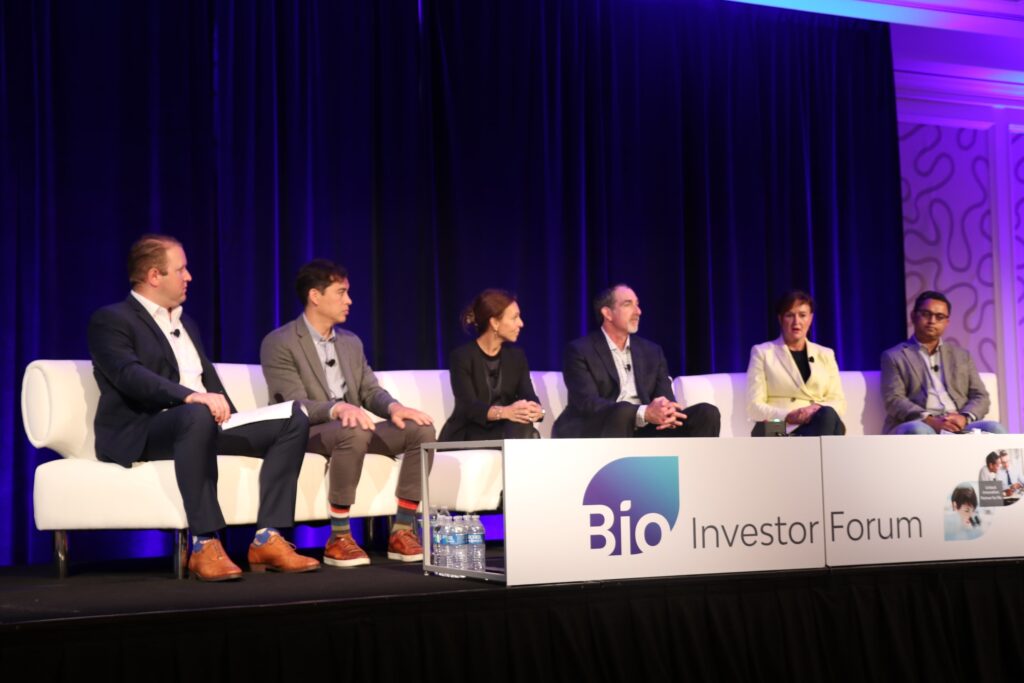The only constant is change. The trick for entrepreneurs and investors, it would seem, is to map and anticipate that change and operate with a level of plasticity that ensures their science, technology, and platforms receive adequate funding and support.
The 2023 Biotechnology Innovation Organization (BIO) Investor Forum kicked off on October 17 with Approaches to Financing Early-Stage Companies—an apt start that mapped larger market trends and provided advice for early-stage companies looking to advance into the market.
It is more important than ever for early-stage companies to demonstrate their distinct strengths as investors evaluate their priorities. Hear more from @HSBC's Jonathon Norris at #BIF23. pic.twitter.com/TIIGt1Y9uR
— I Am Biotech (@IAmBiotech) October 17, 2023
The state of venture capital
Jonathan Norris, Managing Director of HSBC Innovation, set the stage by presenting the HSBC Venture Healthcare Report. “Overall in venture healthcare, if you look at all the deals done in the U.S. and Europe in the first half of this year, we’re at $23.8 billion,” he said. “If you annualize that number, we’re between 35% down from 2020 to 60% down from 2021. But really, 2021 was the year that every record that could be set in terms of financing deals was set.”
While Norris acknowledged that markets in venture healthcare were down, he contextualized why: “One, we’re seeing a lot more add-on insider financing versus new investor-led financing,” he said. “And two, that pre-IPO round of the $200 million plus is definitely down versus what we’ve seen over the past few years.”
“In the first half of 2023, as valuations underwent a necessary reset, Venture Capitalists (VCs) emerged from their cautious stance and embarked on a fresh new wave of investments,” HSBC’s report explains.
VCs have been buoyed by funds raised in 2021–2022 and assumed the role of leading later-stage rounds as crossover/hedge funds retreated. “Despite this encouraging development, the pace of new investments remained measured, with approximately 50% of deals in 2023 consisting of add-on or insider rounds. All in all, the current landscape presents both management and investors with a number of challenges as we settle into the latter half of 2023 and into 2024.”
Essentially, investors are looking for companies that are at a later stage. So, while an early-stage biotech can be preclinical, the amount of money companies need to raise will need to get them into the clinic as they look forward through 2023 and 2023.
What biotech investors want
Despite all of this, both the investors and seasoned entrepreneurs on the panel were optimistic.
Kevin Forrest, Chief Executive Officer and Co-Founder of Kate Therapeutics, spent the pandemic building and funding his company out of his garage.
“The times were pretty turbulent,” he said, “but it was one of the most productive times of my career.”
With the help of early seed funding, Forrest focused on what was important: the deep details of their primary therapeutic goal, and the focused development of their product. Through focusing on these two areas, Forrest and his team got to know intimately the needs and stories of their patients—stories he could then share with investors.
As every investor on the panel expressed, a good story matched with solid milestones and a solid budget is the best way to hook an investor. Forrest’s story of creating a platform that helps patients with genetic muscle diseases without risking damage to the liver proved to be a strong enough hook to build his company.
“We got funding and we built the company into about 45 people now,” Forrest said.
But efficiency and innovation were cited as equally important aspects to garnering funds, especially as the industry finds itself being a larger entity with relatively static funds.
“One of the things that we look for in the companies we invest in is that they have to be faster or cheaper in some context,” said Kiersten Stead, Managing Partner at DCVC Bio. “And so we expect them to be able to run multiple programs at the cost of a single program.”
“I do think one of the positive aspects of the current market is that, hopefully, we’re not going to see king-maker funding rounds where investors sink $800 million into a given entrepreneur,” added Stead. “Such markets imply greater diversity and better management of funds by early-stage companies.”
“There is money, emphasized Stead, “but you have to be judicious.”

The outlook for biotech investment
You also have to be fastidious, communicative, and collaborative, as Forrest explained.
“Early-stage funding days are really important because you are building very long relationships. You have to make sure that you and your investors are working together on this journey. You can find yourself with a very short tenure if there’s misalignment—I would definitely do your diligence regarding who you’re working with,” he said.
“This year is going to end up probably better than 2019,” said Asish Xavier, Vice President of Venture Investments at Johnson & Johnson Innovation. “I know it feels like a downmarket compared to 2021, but the COVID era was an aberration.”
“It’s still a good fundraising environment for all stages of companies,” continued Xavier.
“I think my optimistic perspective is that the biopharma industry has been around for a long time,” said Norris. “There are ups and downs and as we are concluding a very long upcycle I think there’s a refocus now….I think a positive for the industry is that we have veteran investors who have been there and done that, and then you have a lot of new investors who are learning, and I think that’s setting the stage for a smart way to work.”
“At the end of the day, despite all the craziness in the world right now, this is an innovation, glass-half-full, optimist’s industry,” concluded Forrest. “Everybody here is doing important stuff. We are trying to change the world for patients.”




